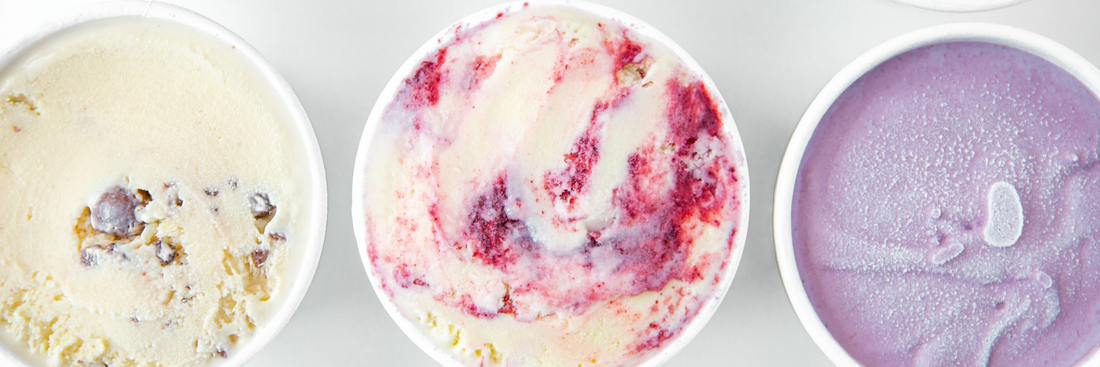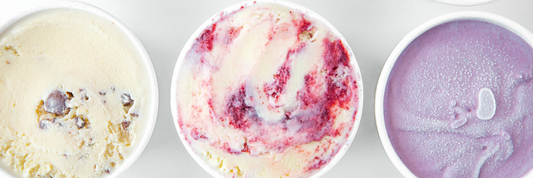Insulated packaging is essential in the ice cream industry, maintaining the desired temperature and ensuring product freshness. This article explores the types, properties, features, and benefits of insulated packaging for ice cream containers, emphasizing their effectiveness in keeping ice cream cold for extended periods.
Types of Insulated Packaging for Ice Cream Containers
Double-Walled Insulation
Description: Double-walled insulated containers feature two layers of insulation material with an air gap between them. This design enhances the container’s ability to maintain temperature by minimizing heat transfer.
Benefits
- Superior Thermal Insulation: The air gap between the walls acts as an additional barrier to heat, providing superior insulation.
- Durability: The dual layers add structural strength, making the container more durable and resistant to damage.
- Extended Cooling Period: Ideal for long-distance transportation and extended storage times.

Single-Walled Insulation
Description: Single-walled insulated containers consist of one layer of insulation material. While not as effective as double-walled insulation, they still provide adequate thermal protection for shorter periods.
Benefits
- Lightweight: Easier to handle and transport due to their lighter weight.
- Cost-Effective: Generally more affordable than double-walled options, making them suitable for short-term use and smaller budgets.
- Space-Saving: Occupies less space, which can be advantageous for storage and transportation.
Features and Benefits of Insulated Packaging Ice Cream Containers
Ice cream containers with proper insulation offer several features and benefits:
- Maintains Temperature: Keeps ice cream at the optimal temperature, preventing melting and refreezing cycles that can degrade quality.
- Preserve Quality: Ensures the texture, flavor, and appearance of ice cream remain intact from production to consumption.
- Durability: Sturdy materials protect against physical damage during handling and transport.
- Extended Shelf Life: Proper insulation helps extend the shelf life of ice cream by maintaining its frozen state.
- Branding Opportunities: High-quality containers can be custom-printed to enhance brand visibility and appeal.

Do Ice Cream Containers Keep Ice Cream Cold For Longer Periods?
Yes, ice cream containers designed with effective insulation can keep ice cream cold for extended periods. The duration depends on several factors, including:
- Quality of Insulation: Higher quality materials like polyurethane foam or VIPs provide better insulation than standard materials.
- External Temperature: The ambient temperature and exposure to heat sources can affect the container's performance.
- Additional Cooling: The use of gel packs or dry ice can significantly extend the cold retention period.
By choosing the right type of insulated packaging, ice cream manufacturers and retailers can ensure their products stay cold and fresh, even during long transportation times.
How Do Ice Cream Containers Achieve Cold For Longer Periods?
Let's explore the factors that contribute to the effectiveness of keeping ice cream cold:
Insulation
Typically, ice cream containers are constructed from insulating materials to help keep cold temperatures consistent. Typical materials consist of insulated foam, cardboard, and plastic. By forming a barrier between the ice cream and the outside temperature, these substances aid in lowering heat transfer and delaying the melting process.
Thermal Resistance
The materials used to make ice cream containers have certain thermal characteristics that help them maintain their coldness. Insulated foam containers, for instance, have superior thermal insulation qualities that aid in keeping heat out of the container and retaining cold air inside.
Tight Sealing
Maintaining the ice cream container's cold temperature requires proper sealing. In order to stop air from escaping or entering, many ice cream containers have tightly fitting lids or seals. This keeps the ice cream from melting too soon and helps to maintain its cool temperature.
Size and Shape
Custom ice cream containers' capacity to maintain cold ice cream can also be influenced by their size and shape. Smaller containers that have less empty space allow for less warm air to escape, which helps keep temperatures lower. Better thermal protection is also provided by containers with thicker walls or multiple layers of insulation.
Transportation Considerations
Ice cream containers frequently have handles or reinforced edges for easy handling and stacking while in transit. These features are often included in their design with transportation in mind. It is possible to reduce temperature variations and guarantee that the ice cream stays cold during the trip by using appropriate packaging and handling techniques.
Environmental Conditions
The ability of ice cream containers to keep ice cream cold can be impacted by environmental factors like humidity and ambient temperature. For example, ice cream containers may need to provide greater insulation and a tighter seal to avoid melting in hot and muggy climates.
Use of Ice Packs
To further prolong the cold storage period, ice packs or dry ice may occasionally be used with ice cream containers. During storage and transit, lowering the temperature and maintaining the cold chain can be achieved by packing ice packs inside or outside the container.
Consumer Practices
Keeping ice cream cold is also influenced by how consumers handle and store it. To maintain the cold temperature of the ice cream, for instance, place ice cream containers in the freezer as soon as they are purchased and try to serve them without spending too much time outside the freezer.
Conclusion
Insulated packaging is vital for maintaining the temperature and quality of ice cream and other temperature-sensitive products. With various types of insulated packaging available, from foam and reflective insulation to vacuum panels and supplementary cooling methods, businesses can select the most appropriate solution for their needs. High-quality insulated ice cream containers not only keep the product cold for longer periods but also preserve its texture, flavor, and overall quality, ensuring customer satisfaction and brand loyalty.
Related Articles:







